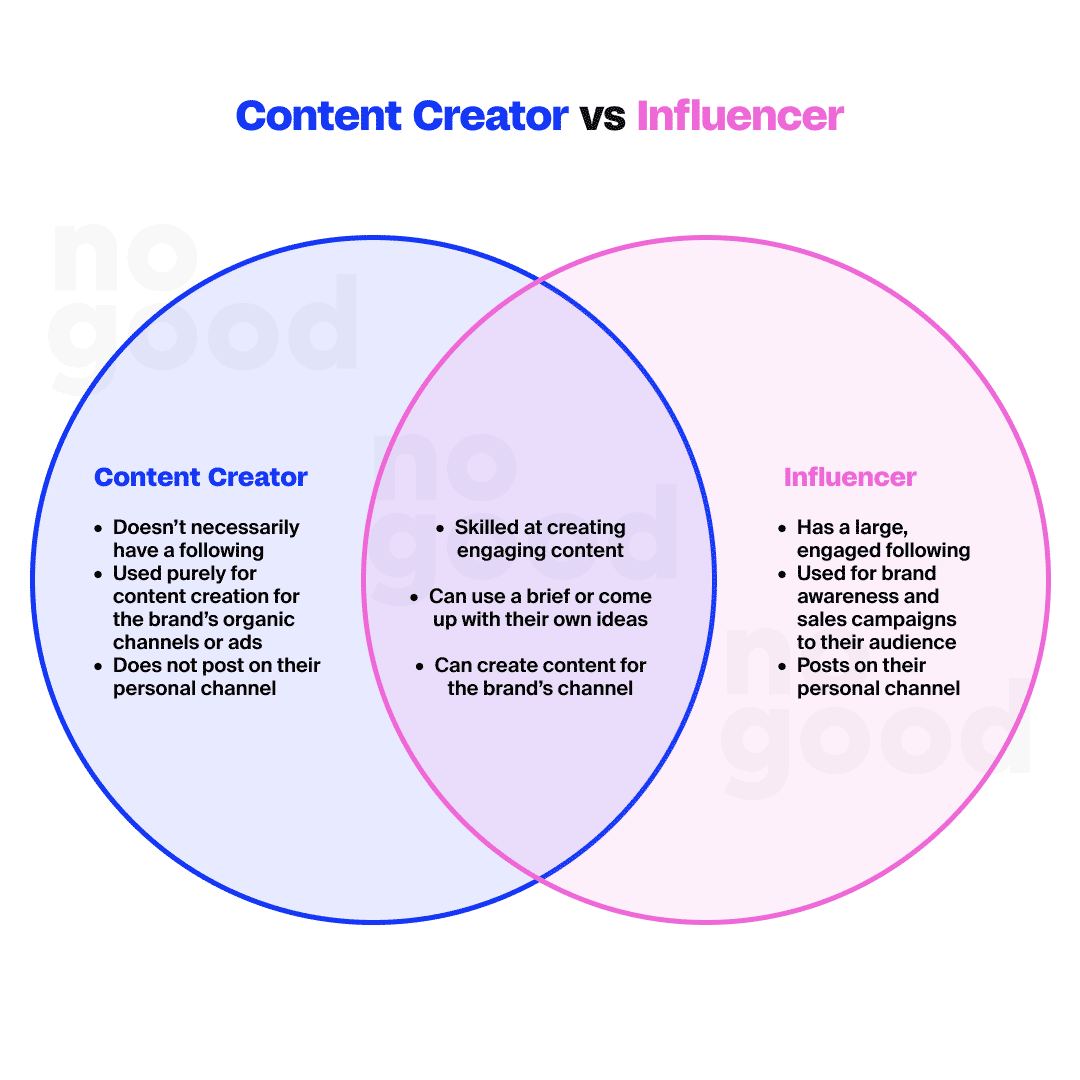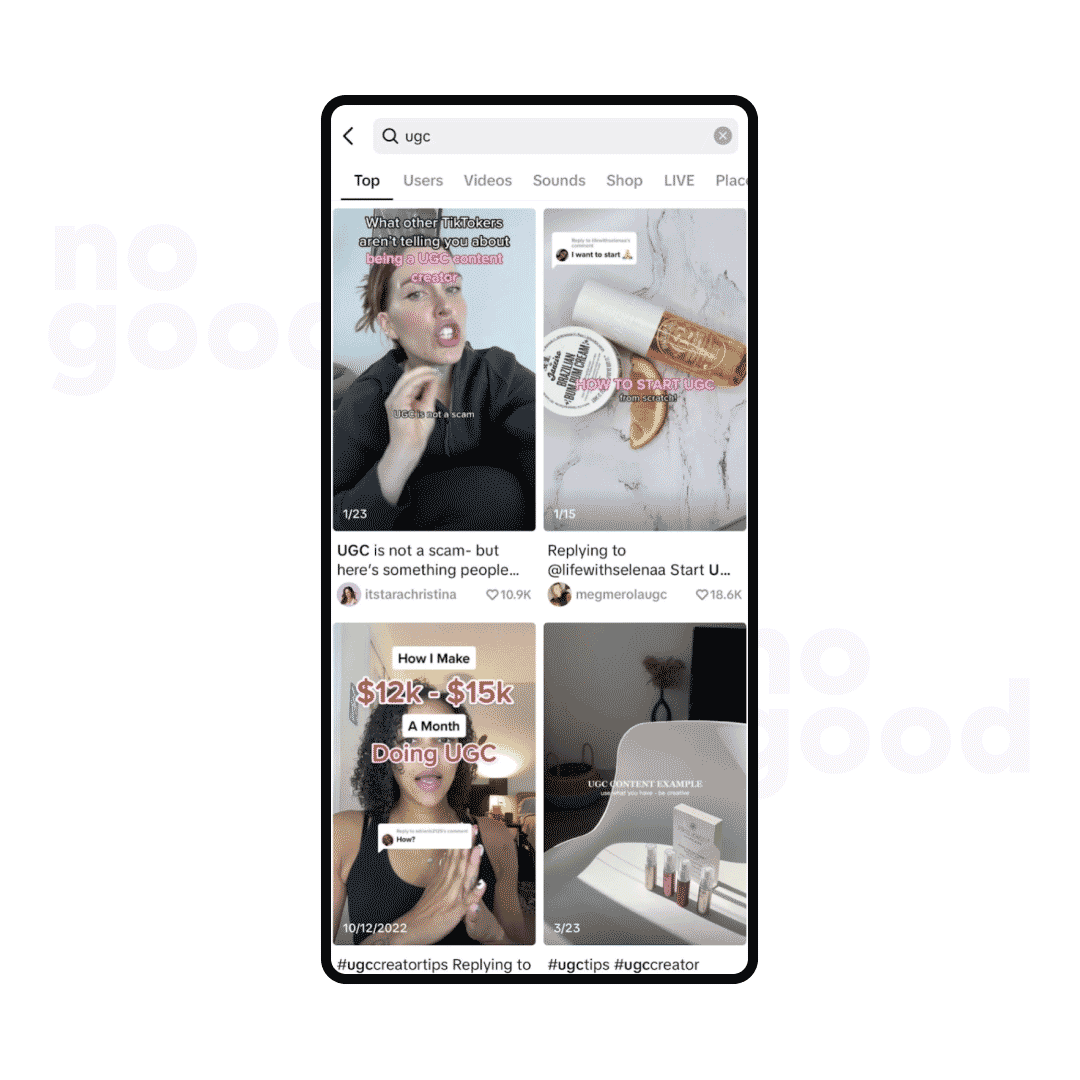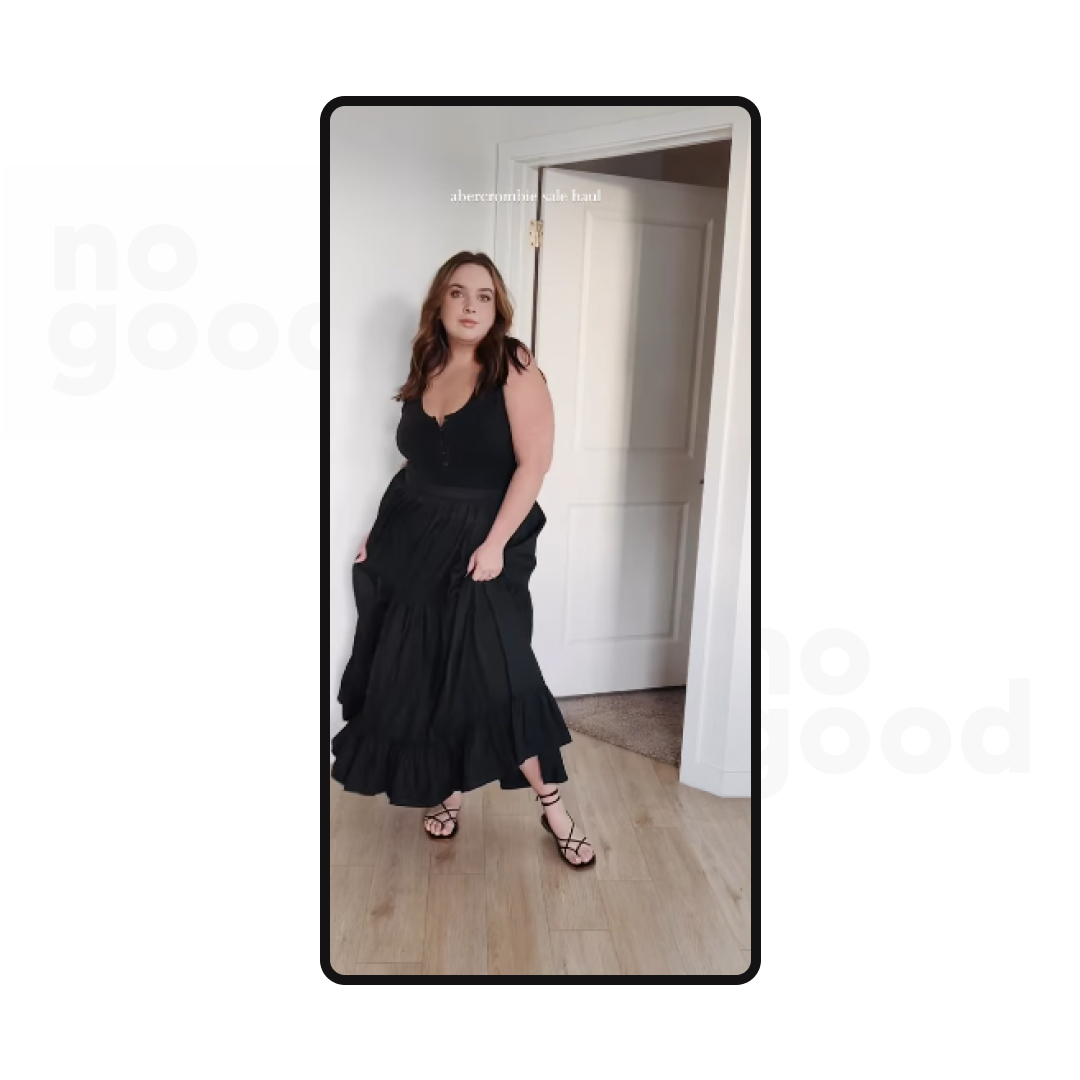Similar to how a square is a rectangle but a rectangle is not a square, an influencer is a content creator but a content creator is not necessarily an influencer.

What is a content creator?
A content creator is anyone who is creating “content”, or anything that contains information, through any media or channel. Now that is quite broad, so let’s break it down. This usually means they write blogs, produce audio, design graphics, or create videos that entertain or educate in some type of way and they share that information through a digital platform such as a blog, social media platform, or streaming service. However, this does not necessarily mean they have an audience.
What is an influencer?
An influencer is someone who not only creates some type of content but also has a somewhat large audience that they have sway over and can therefore influence them to take action such as make a purchase, etc. These influencers have built online communities that know, like, and trust them, so much so that if they feature a brand or a product, they can persuade their audience to convert and support the brand. So yes, they do create content, but they also have an audience to promote that content to — and their hottest commodity is their reach and audience.
However, having an audience is not the only value.
How to Use a Content Creator vs. an Influencer
When planning your digital marketing strategy, both content creators and influencers have separate but important purposes.
How to Use Content Creators
Content creators can be used in several different capacities, particularly on social channels. However, any work done with a content creator is intended to be used on your own platforms whether that be your socials, blog, or other channels.
1. As a Consistent Brand Face/Representative
As a brand you can hire a content creator to make content on a regular basis for your social channels. This person acts as a face/liaison for your brand and your community. A good example of this is Erin Confortini who is now the primary creator for Ditch.io. This is a great way to have someone who is authentically connected with the brand act as a voice to your audience online. This also allows the creator to have more interaction with the community and understand their needs, language, and culture more.
2. As a UGC Creator
Content creators are also there when you need a few pieces of content to fill out your
content schedule or ad campaigns. You may have a few creators creating a couple of pieces of content a month to put on your social channels, or you may have them create a few ads for your next campaign. Either way, this interaction usually includes a brief and someone managing that creator and the overall strategy.

How to Use Influencers
Remember, influencers are technically content creators as well. Therefore you can work with them in the above capacities, but you can also take advantage of their audiences through influencer partnerships.
An influencer partnership refers to a collaborative relationship between a brand and an influencer. It involves working together to create and promote content that aligns with the brand’s objectives and resonates with the influencer’s audience (both of which are important for success!).
In an influencer partnership, the brand typically engages an influencer who has a significant following and influence within a specific niche or industry. The partnership can take various forms, depending on the goals and preferences of both parties. This can include:
1. Sponsored Content
The brand pays the influencer to create and promote content that features or highlights
the brand’s products, services, or campaigns. This can be in the form of social media
posts, blog articles, videos, or other types of content that the influencer specializes in.
2. Product Reviews and Endorsements
This is when the brand sends the influencers their products to test and use and the influencer then shares their honest opinions, feedback, and recommendations with their audience, potentially driving awareness and interest in the brand.
Example: Influencer Emily Leah was gifted these pieces from Abercrombie and she created this video showing the pieces.

3. Brand Ambassadorships
In a long-term partnership, the influencer becomes a brand ambassador, representing and promoting the brand on an ongoing basis. They may create content, participate in events, and act as a spokesperson for the brand within their niche. This is great for influencers that you have consistently worked with in the past and/or are already connected in your community.
4. Affiliate Marketing
This is when the influencer shares trackable affiliate links or discount codes with their audience. When their followers make a purchase using these links or codes, the influencer earns a commission or receives some form of compensation from the brand. This can be the only term in the partnership agreement or it can be in addition to a sponsorship.
An effective influencer partnership leverages the influencer’s credibility, authenticity, and rapport with their audience to promote the brand’s message, products, or services. It is important for the partnership to be transparent and aligned with both the influencer’s and the brand’s values and goals, so we encourage you to provide a detailed brief but allow creative freedom since the influencer knows their audience best.
How to Find Creators to Work With
Ready to launch some content? Here is how you find the right content creator or influencer for your brand.
You can find content creators through agencies, outbound research, the TikTok Creator Marketplace, or posting opportunity on job boards or casting sites. A few important factors to consider when choosing a content creator…
1. Does their voice and delivery style match the brand voice?
Finding a content creator that fits your brand is similar to casting for a role. They are acting as a representation of your brand, so the way their voice should match or compliment the brand’s in some way. For example, if your brand is much more serious and informative, a sarcastic creator probably isn’t the way to go.
2. Do they reflect your audience or someone they would listen to?
The creator doesn’t need to perfectly match your audience but they should make sense. If you are a brand focused on mothers, a young creator with no children won’t be able to speak to that audience in the same way another creator would.
3. What is their creation range?
Content comes in all shapes and sizes. Video creation can mean comedic sketches, informative videos, or even trending sounds. Blog writing could be educational, sarcastic, satirical, etc. You may want someone who specializes in the comedic space, or you may need someone more well-rounded.
NoGood has a team of internal creators and a network of creator partners we work with to create the best content for your brand. If you are looking for a content creation partner, you came to the right place.
How to Find Influencers to Work With
Again, influencers can be found in similar ways as content creators through agencies or by reaching out individually to the creator. All of the factors for a content creator apply, but you have to think of some other factors as well when you are engaging in an influencer partnership that involves their audience.
1. Do they have an engaged audience?
Follower count does not necessarily mean a loyal following. Someone with 1M followers may not have the influence to action that someone with 100K could have. This can be measured through the creator’s engagement rate and through a qualitative analysis of their account.
2. Do they have experience promoting a brand before?
Though not a necessary requirement, taking a look at previous collaborations or brand features they have done will give you an idea of how their audience reacts to them and what could be a key to your collaboration being successful.
Including the factors mentioned for the content creator, will give you a good idea of whether or not this influencer is a good fit for your brand.
As you are looking into your influencer marketing strategy, we highly recommend engaging multiple influencers at a time for your campaign in order to maximize how many people your brand is exposed to and the potential for them to hear about you more than once.
And of course, if you need help launching your influencer marketing campaign — we’ve got your back.
So, Can a Content Creator Be an Influencer?
Yes, a content creator can be an influencer. However, not every content creator is an influencer. It’s worth noting that many content creators do build a following because they are good at creating content, so don’t write off an influencer if you are looking for someone to create content for your channels.
As you are building your digital strategy, remember to consider what kind of partnership you are looking for and what creator would best represent your brand. There are many ways to engage with creators whether it be as a brand ambassador, on a sponsored post, or to regularly create content for your brand’s channels. The most important key to success is ensuring the content is authentic and provides connection between your brand and your audience.






